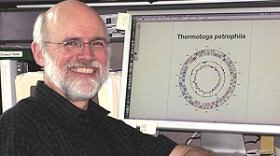In today’s Academic Minute, Professor Robyn Metcalfe of the University of Texas at Austin explains the complex supply chain that keeps food on your table.
Audio File
Dr. Robyn Metcalfe, University of Texas at Austin – Logistics and Food Supply
Edit | Remove
Robyn Metcalfe is a visiting scholar, lecture, and Director of the Food Lab at the University of Texas at Austin. The Food Lab provides awareness of food issues, encourages and motivates innovative food systems research, and provides support to startups that leverage university research. She holds a Ph.D. from Boston University.
Dr. Robyn Metcalfe – Logistics and Food Supply
We’ve just heard about the world’s largest hurricane that pummeled the Philippines. What impact does a natural disaster of that size have on the food supply chain? How did New Yorkers get fed during the first 24 hours after Hurricane Sandy ripped through the interior of Manhattan? The world’s urban food system is a miracle.
From the farmers who raise crops and livestock to the processing plants that transform food from the raw materials to the consumables that hardly resemble their natural origins, as food travels along the supply chain, on its way to the plate, human effort and ingenuity converge. That this complex global system is not constantly breaking down is a miracle. Natural disaster, political upheaval or economic downturns do impact the global food supply chain, but only in very rare cases is the system derailed. The resilience of the system is nothing short of miraculous. The web of human relationships is what gives the system it robustness.
After the immediate danger of Hurricane Sandy had passed, restaurants and businesses in Manhattan were supporting each other, sharing distributors and raw materials, offering what they had and asking for what they needed in order to get food on the table. Make no mistake; it was not business as usual, but the food supply chain is able to function in spite of destroyed infrastructure, working around obstacles and solving problems by improvising. This same innovation needs to be harnessed to solve the next big problem facing humanity, and that is: How are we going to feed 9 billion people in 2050?
Production support for the Academic Minute comes from Newman’s Own, giving all profits to charity and pursuing the common good for over 30 years, and from Mount Holyoke College.





